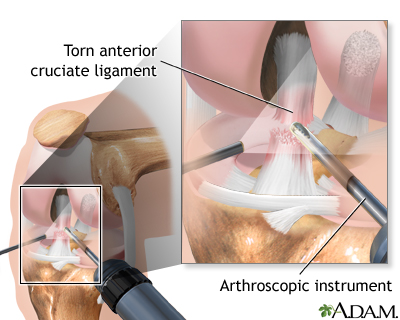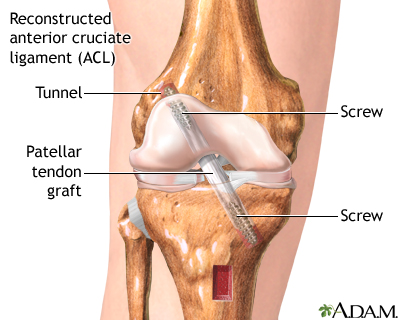Health Library
Knee arthroscopy - series

Normal anatomy
The knee is a complex joint made up of the distal end of the femur (femoral condyles) and the proximal end of the tibia (tibial plateau). A number of ligaments run between the femur and the tibia in the knee joint. The anterior cruciate ligament, the posterior cruciate ligament, and the meniscal ligaments are among the ligaments of the knee joint.

Indications
Injury to the ligaments of the knee are common sports-related injuries.
Arthroscopy, which involves the use of a small camera and small instruments on the end of long narrow tubes, introduced into the knee through small incisions, may be recommended for knee problems such as:
- A torn knee disc (meniscus)
- A damaged knee bone (patella)
- A damaged ligament
- Inflamed or damaged lining of the joint (synovium)

Procedure, part 1
Several small punctures are made into the knee joint while the patient is deep asleep and pain-free (general anesthesia) or sleepy (sedated) and pain-free (regional anesthesia or spinal anesthesia).

Procedure, part 2
The viewing scope (arthroscope) and other instruments are inserted into the knee joint. The surgeon can see the ligaments, the knee disc (meniscus), the knee bone (patella), the lining of the joint (synovium), and the rest of the joint. Damaged tissues can be removed. Arthroscopy can also be used to help view the inside of the knee while ligaments or tendons are repaired from the outside.

Aftercare
Patients are usually able to leave the hospital after arthroscopic knee surgery within 24 hours of surgery. The recovery time, and the need for physical therapy after surgery are determined by the injury treated and the procedure performed.
Related Information
Kneecap dislocationKnee arthroscopy
BACK TO TOP
Review Date: 6/13/2021
Reviewed By: C. Benjamin Ma, MD, Professor, Chief, Sports Medicine and Shoulder Service, UCSF Department of Orthopaedic Surgery, San Francisco, CA. Also reviewed by David Zieve, MD, MHA, Medical Director, Brenda Conaway, Editorial Director, and the A.D.A.M. Editorial team.
 | A.D.A.M., Inc. is accredited by URAC, for Health Content Provider (www.urac.org). URAC's accreditation program is an independent audit to verify that A.D.A.M. follows rigorous standards of quality and accountability. A.D.A.M. is among the first to achieve this important distinction for online health information and services. Learn more about A.D.A.M.'s editorial policy, editorial process and privacy policy. A.D.A.M. is also a founding member of Hi-Ethics. This site complies with the HONcode standard for trustworthy health information: verify here. |
The information provided herein should not be used during any medical emergency or for the diagnosis or treatment of any medical condition. A licensed medical professional should be consulted for diagnosis and treatment of any and all medical conditions. Links to other sites are provided for information only -- they do not constitute endorsements of those other sites. © 1997- 2021 A.D.A.M., a business unit of Ebix, Inc. Any duplication or distribution of the information contained herein is strictly prohibited.
